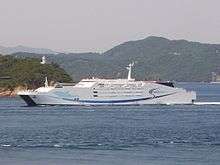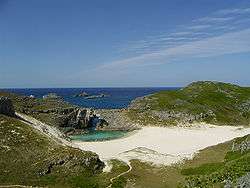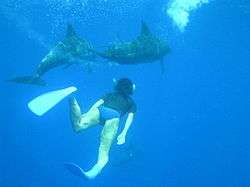Ogasawara Islands
The Ogasawara Islands (小笠原諸島 Ogasawara-shotō) are an archipelago of over 30 subtropical and tropical islands, administratively part of Tokyo but about 1000 km away from the city. They were known as the Bonin Islands, and many fierce battles were fought in the area during World War II, most notably at Iwo Jima (硫黄島 Iōtō).
The Ogasawara Islands were added to UNESCO's list of World Natural Heritage sites in 2011 as animals and plants there have undergone unique evolutionary processes since these islands have never been connected with a continent, thus often dubbed as the "Galapagos of the Orient".
Understand
The Ogasawara Islands are about 1000 km away from Tokyo. They are made up of over 30 subtropical and tropical islands but only Chichijima (父島 "Father Island") and Hahajima (母島 "Mother Island") are inhabited. Almost the whole area of the islands is included in the Ogasawara National Park, which is full of beautiful nature. You can visit the marine park as well. This is an area known for whale watching. Although the access to the islands is limited to ship, it is always highly popular among tourists.
Ogasawara has a very diverse and rich history. The first inhabitants to colonize Chichijima came from the West!
Get in

There are no airports in the islands, so transportation is limited to the Ogasawara Kaiun ferry, the Ogasawara Maru, departing from Takeshiba, Tokyo to Chichijima. The ferry runs every three days in each direction and takes 24 hours one way in good weather, but longer if the sea is rough (and it often is). Please note that in bad weather the Ogasawara Maru travels at a slower speed and thus arrives at the destination late. As a result, many tourists have missed connecting trains and flights. Be sure to purchase travel insurance and to schedule your travel itinerary to compensate for this unpredictable event. One-way tickets start from ¥29,250 for second class tickets.
There is only one way to get to Iwo Jima (硫黄島 Iōtō) and that is through the Military Historical Tours, which have been granted exclusive rights to conduct tours of the island. At present the tours are only open to US citizens.
Get around
A public bus runs around Chichijima several times daily, connecting most points of interest. Single fare ¥300.
Chichijima Taxi will chauffeur you anywhere on the island via air conditioned car. Chichijima Taxi, as well as numerous other companies on the island, rent 50cc mopeds to drivers with a Japanese driver's license. Seibi Kojo rents large vans and passenger cars at reasonable prices. Bicycles can be rented at many guest houses (or used for free in some cases). Additionally, some guest house owners will lend their automobile to guests.
The Hahajima-maru, operated by Izushoto Kaihatsu, runs between Chichijima and Hahajima roughly every other day, with services timed to meet the ferry to/from the mainland. The trip takes about two hours.
There is no regular service to any of the other islands, although the Mukojima group to the north of Chichijima is occasionally visited by charters. World War II sites like Iwo Jima are dangerous due to unexploded ordnance and thus off limits without a permit.
See

The most famous spot in Ogasawara is Minamijima. There, you can see a very beautiful arch over a turquoise blue lagoon. You can often see rare birds, including the ahōdori, or albatross.
Another famous location is Kominato Beach. You can see a white sand beach and stunning limestone rock formations.
Anijima is a nice spot. You can go fishing in Cabbage Beach. Cabbage Beach has many tropical fish.
Weatherstation is a beautiful spot where you can look at a beautiful sunset!
In the flat fields behind Mount Suribachi, you will find the ruins of an airfield assaulted by Allied Shermans during the Battle of Iwo Jima, plus burned out bunkers lying on hillsides or in the ground.
Do

- Whale watching
- Scuba diving
- Dolphin swimming
- Snorkeling
- Sport Fishing
- Trekking
There are many well marked and maintained trails in Ogasawara. On Chichijima, the Ogiura-Yuhodo Trail is newly opened in 2011. The starting point is Ogiura Beach, and the trail encounters a tunnel constructed during World War II by Japan for use on a war road. Next, the trail crosses a small river before arriving at the Renju Dam. The trail follows an old road from before World War II that was used by the people to travel between their farms and town. The trail next takes us to Tengunohama Viewpoint, where you can see Futami Bay, Ogiura Beach and Yagiyama. Following the trail, you arrive next at Renju Dam Viewpoint, where you can see Renju Dam and the entire valley. The trail continues up into the forest where the trees are high and wet. If you are lucky, then you may see Chichijima's endemic pigeon and endemic fruit bat.
- Swimming and Snorkeling
Boasting many beautiful beaches, Chichijima offers plenty of opportunities to get in the water.
Sakaiura Beach has a shipwreck and many beautiful fish. Also, sunset is very beautiful from Sakaiura.
Aotodai is very exciting and popular with young people and locals.
- Sea Kayaking
- Outrigger Canoeing
- Water Skiing and Wake boarding
- Windsurfing
- Surfing
- Stand Up Paddleboarding (SUP)
SUP is quickly becoming a popular pastime in Chichijima. During whale season, you can go whale watching on a stand up paddleboard. Also, bring snorkel equipment to enjoy beautiful underwater viewing.
- Traditional Crafts
Takanohazaiku is a traditional island craft using the boiled leaves of the Tako tree. You can make many items from the woven leaves: bracelets, bags, rings, boxes, photo frames and charms. Asuka Craft sells these items and the owner of the craft show will kindly show you how to make them.
- Organic Farming
- Nature Conservancy
- Bird Watching
- Photography
Buy
Eat
Tetsuya has Japanese cuisine. Although they do not have a menu because they have a set course, their cuisine is satisfying and delicious - an islanders' favorite! Don't forget to make a reservation before you get there. Tetsuya is near Kominato Beach. It is difficult to walk there, and if you walk, it takes about 1 hour.
Buono Horizon This restaurant serves Italian cuisine. They have delicious handmade pizza and pasta. If you have a date with an important person, you should go there.
Gorosuke is a “hole in the wall” shop. Gorosuke only serves bento, or boxed lunches. Gorosuke is popular because you can get a big bowl of food for a very reasonable price. Gorosuke is known for it’s Papaya Curry, which is rich, spicy, and served with a huge heap of rice.
While it might be seen as ethically problematic, you can sample sea turtle in Ogasawara. Turtle meat is a traditional island food that dates back to the early 19th Century when the island was first settled. It is considered a delicacy and in no way is prohibited under Japanese law. There are two dishes made with sea turtle meat. Kame sashimi (Turtle Sashimi) is raw meat served chilled with wasabi and soy sauce. Kame stew is preferred in the winter months where it is served hot in a light broth. Turtle meat dishes can be found at many restaurants, most notably at Kanza, Fukuchan and Como. Additionally, turtle products (canned turtle meat, turtle eggs) can be purchased at both of Chichijima's major grocery stores (Super Koiwai and Seikyo).
Shimazushi is the traditional island sushi. It is made from the sawara fish (wahoo in English). Sawara is sliced and lightly marinated in soy sauce. Instead of using wasabi, a dab of spicy mustard is placed under the sliced sawara and then rested on a bed of sushi rice. This traditional island sushi migrated to the Ogasawara island from Hachijojima in the 19th century, when natives from Hachijojima were sent to Ogasawara to form a colony in order to strengthen Japan's claim on the Ogasawara islands.
Try the local island sushi as well, it's made from katsuo tuna and served with soy sauce and pickles.
Drink
Yankee Town has a unique style. Yankee Town has a barbecue pit that can be used by a large group of people. The owner of Yankee Town has many interesting stories about the island. Yankee Town is known for its Piña Colada. Sometimes, Yankee Town has live concerts featuring local musicians.
There are only two main streets in downtown Chichi Jima, both having several comparably priced bars.
Sleep
Before choosing an accommodation, please consider what kind of accommodation you prefer.
There are 2 hotels and many minshuku, which are Japanese-style bed and breakfasts.
Before booking, consider the following:
- Decide whether you will eat meals at your accommodation or not. Many minshuku can provide meals for their customers.
- Consider whether or not you would like a private bathroom. There are not so many accommodations that have private bathrooms for each room.
- Credit cards are not accepted for payment at almost all accommodations.
Once you have considered these options, please contact the Ogasawara Tourist Association. They will give you the telephone number of the accommodation that will fit your request!
Be aware that there are about ten minshuku and a youth hostel in Hahajima. If you would like to stay in Hahajima, you need to contact the minshuku beforehand as they might be full.
Hotels in Chichijima:
Horizon Hotel Location: Ougiira
Papa's Island Resort Location: Nishimachi
Chichijima View Hotel Location: Higashimachi When you get off the Ogasawara Maru, you can find this hotel. This hotel has rooms with bathrooms.
Minshuku/Bed and Breakfasts in Chichijima:
Seatopia
Noa
Nadowado Location: Miyanohama
Apartment Style Accommodations:
Anoru
Additional Accommodations:
Ogasawara Youth Hostel
Connect
The Ogasawara Village Tourist Association provides friendly and patient guidance to all travelers free of charge. The Ogasawara Village Tourist Association can help you book a night's accommodation, reserve a dolphin swim tour, and help you arrange any activity you might want to do on the island.
Assistance is available in English at the Ogasawara Village Tourist Association. Please be aware that there are no native English speakers that work there, and while they are happy to help, you must remain patient.
- 🌍 Ogasawara Village Tourist Association (B-Ship building across from the Village beach - (look for the building with the large whale mural), ☎ +81 4998 2 2587, e-mail: info@ogasawaramura.com.